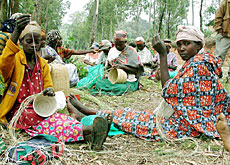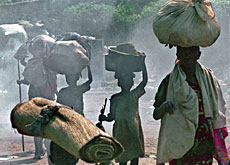Government renews aid to Rwanda

The Swiss development aid programme for Rwanda is to continue, despite the current crisis in the central African nation.
The Swiss Agency for Development and Cooperation (SDC) announced the decision after a five-day visit to the country by Switzerland’s senior aid official, Walter Fust.
His trip came as Rwanda launched the biggest phase of hearings to try up to one million people suspected of involvement in the 1994 genocide.
Rwanda has been accused of military intervention in the Democratic Republic of Congo, and has faced criticism for its failings in “good governance” and in the transition to democracy.
The SDC said in a statement that the Swiss delegation had agreed to draw up a new memorandum of understanding to serve as the basis for future development cooperation.
Assessment
The delegation had flown to Rwanda to make a first-hand assessment of the progress of current development work and to discuss its future course.
Swiss aid had been criticised for being too close to the Hutu regime at the time of the genocide in 1994. Bern suspended its projects in the country, which ended more than 30 years of cooperation.
But a special programme of about SFr5 million ($4.23 million) a year was initiated in 1998, concentrating on good governance, law, the transition to democracy and human rights.
The statement said that the SDC programme for Rwanda would concentrate in future more closely in a regional context on security, peace and development.
Under the terms of the current memorandum of understanding, talks with the Rwandan authorities dealt with issues concerning the development of Rwanda in general and bilateral cooperation in particular.
Human rights
The SDC said that Switzerland would continue to focus on Kibuye province in its current cooperation activities in the fields of health services and the strengthening of local administration and decentralisation.
And at the request of Rwanda, this would include the promotion of local justice, with particular attention to human rights.
Support for the Gacaca process, a traditional judicial procedure to deal with the genocide, would also be continued at the national level.
swissinfo with agencies
The SDC concentrates mainly on Kibuye Province in the west of the country.
It began a health programme in Kibuye in August 2002, focusing on the prevention of malaria, HIV/Aids, and diarrhoeal diseases in mothers and children.
The SDC has mandated the Swiss Tropical Institute in Basel to carry out the programme.
The special cooperation programme between Bern and Kigali was agreed by parliament in 1998.
Costing about SFr5 million a year, the programme was renewed in 2001 and was due to expire at the end of 2004.
The SDC has now decided to renew it again.

In compliance with the JTI standards
More: SWI swissinfo.ch certified by the Journalism Trust Initiative

You can find an overview of ongoing debates with our journalists here . Please join us!
If you want to start a conversation about a topic raised in this article or want to report factual errors, email us at english@swissinfo.ch.